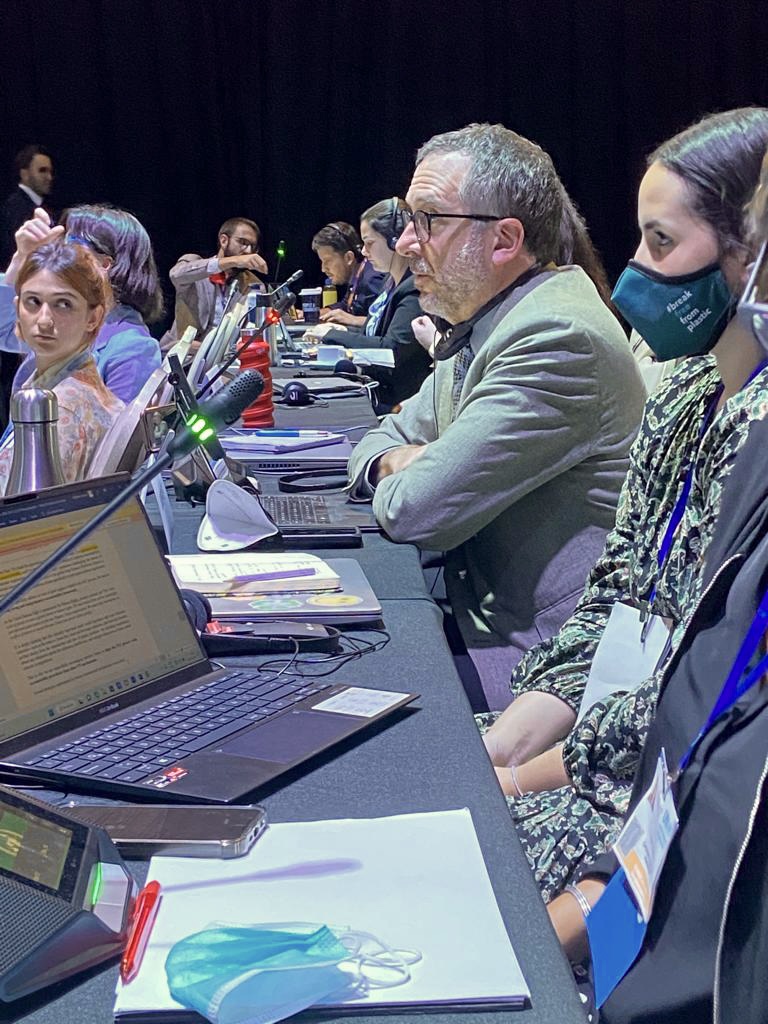ASH’s Policy Director Chris Bostic is attending the first Intergovernmental Negotiating Conference (INC-1) of the United Nations treaty to end plastics pollution in Punta del Este, Uruguay from November 28 – December 3, 2022. He will share updates and progress here for our community to stay engaged and informed.

November 29, 2022 – The highlight of today was a three-hour Multi-Stakeholder Forum. If that title sets off your radar, your radar is well-calibrated. The industries that have caused the plastic pollution problem were given the same platform and respect as civil society groups struggling to stop them. Some were quite subtle, saying the right words and demonstrating the demeanor of a non-profit sincerely searching for solutions (on how to stop themselves, apparently). I was reminded of Philip Morris International doing a media tour touting how they were striving to end the age of the cigarette while continuing their usual production, marketing, and sale of cigarettes. All industry speakers read out a long list of measures they are already taking.
Other industry representatives were more blunt. One industry association at the core of plastics production strongly implied that the best way to solve our problems is for governments to invest more money in them, so they are better resourced to do even more to find solutions. One proven violator of human rights touted their human rights approach. I experienced a mixture of admiration for their hutzpah, disgust at their hypocrisy, and amusement that they thought we would take them at face value.
There was also inspiration. NGOs and even some governments called them out on their hypocrisy, others spoke eloquently about the threat that conflicts of interest pose to the success of the treaty, and some representatives of small countries pleaded that they were bearing the brunt of the problem while reaping none of the profits. ASH, of course, pointed out the danger of listening to the perpetrators of the problem, citing the tobacco industry as the prime historical example (watch our intervention below).
We are still very early in the plastics pollution negotiating process, and we have just barely begun to talk specifics. In spite of industry efforts to misdirect and governments who support them, I am more optimistic now than I was two days ago. I’ve met several government delegations who are sincerely determined to get a strong treaty. I’ve spoken to amazing civil society experts from the environmental and other movements who perfectly understand the stakes of these talks (and the role of the tobacco industry in polluting and poisoning the world).
Our opponents may have more money, but we have the resolve, the expertise, the facts and human rights on our side.
Transcript from the video statement above:
Thank you this important forum and for allowing us this opportunity. My name is Chris Bostic, and I represent Action on Smoking and Health, or ASH, the world’s oldest organization dedicated to ending the harm caused by tobacco. ASH is also a member of the global Stop Tobacco Pollution Alliance, a coalition of tobacco control organizations created to participate in these negotiations.
I want to make two specific points that I believe are important for framing our future collective work.
The first is to echo what has been said by many delegations and members of civil society: not all plastics are the same. They vary in several dimensions. Some are more problematic than others; some are more toxic than others; some are less necessary than others; and some are single-use. Some plastics should be regulated, and some should be banned immediately.
A singular example of the latter is cigarette “filters.” I emphasize that the word filter does not have the same meeting as other filters we have and will discuss in this process, as it implies that they filter some of the harms out of cigarettes. To be clear, they do not. Cigarette filters are made of plastic, and the release of tiny plastic particles during the act of smoking causes additional harm. They make cigarettes more deadly, not less. Cigarette filters are wholly unnecessary.
Once cigarettes are smoked, the filters become cigarette butts, which are full of toxins and carcinogens. A small cigarette butt may seem like a little thing, but one butt dropped into a goldfish bowl will kill the goldfish. Filters are extremely toxic.
Cigarette filters are the most littered item on earth. Approximately 4.5 trillion filters – yes, trillion – are discarded into the environment each year. As you walk down the street tonight, or on the beach, look down. You will see them everywhere.
Other forms of plastic are also problematic, toxic and unnecessary. They should all be banned, and we should spend our time discussing more difficult topics.
My second point is this: just as not all plastics are the same, not all stakeholders are the same. I urge delegations to account for inherent conflicts of interest as they weigh input from observers. To return to tobacco as an example, the tobacco industry is excluded from participating in the WHO Framework Convention on Tobacco Control because of the inherent conflict between their interests and the interests of public health. Not all conflicts of interest are as stark, but I urge you to consider those conflicts. The emphasis on inclusivity is laudable, but the problem we address is too severe to worry about ensuring continuing corporate profits. The overall good of society – environmental, health, human rights, and yes, economic – should be our overriding goal.
Thank you, and best of luck as you move forward. The world is depending on you.